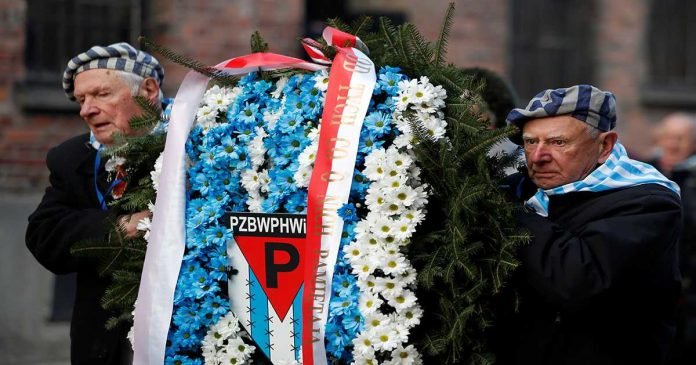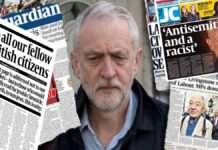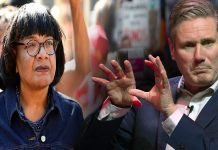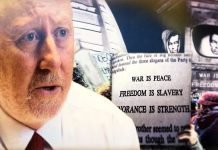
75th anniversary of the liberation of the Nazi German concentration and extermination camp Auschwitz and International Holocaust Victims Remembrance Day
Edith Notowicz first saw Nazi SS doctor Josef Mengele when she arrived at the Auschwitz extermination camp in May 1944, after several days crammed into a cattle train so packed that by journey’s end she and her family had to sit on the dead.
“He was in his military uniform, carrying a conductor’s baton and waving it in the air, whistling, as he was sorting us out – left, right, left, right – deciding who would live and who would die,” said Notowicz, aged 15 at the time and now 90.
Mengele, the “Angel of Death”, picked Notowicz to be part of the medical experiments he was conducting on children, especially twins, pregnant women and other inmates. In Notowicz’s case, she was sterilised by force.
“There were four or five people around me, Mengele as well. They cut me up, without anaesthetic,” she said, drawing an imaginary line on her pelvis. “I screamed and they hit me.”
She lost her parents and siblings in the chaos of their arrival at Auschwitz. She never saw them again.

Now Notowicz, one of very few former inmates still alive, has returned to Auschwitz for the third, and as she says “probably the final time”, to honour the 75th anniversary of the liberation of the camp by Soviet soldiers.
“I want to return there as a free person,” she said. “I want to light a candle for those who did not come back. I owe this to them. They were unknown to me but they were human beings.”
Other survivors have made the journey too: Jona Laks travelled with her granddaughter from her home in Israel.
“I saw hell and I began to cry,” Notowicz said of her visit.
To help her through it, Notowicz recalls happy images from her childhood growing up in rural Hungary with a mother who loved playing the piano, riding horses, swimming in the lake and eating dinner at the weekend with her father. He was away working at his sawmill the rest of the week.
Notowicz did not go back to Auschwitz for most of her adult life. After the war, she returned to Hungary, but managed to leave the then-communist country in the late 1950s.
She moved to Israel, worked in a travel agency in Tel Aviv, and travelled the world whenever she had the time and money. It was in Israel that she met her husband, Naftali Notowicz, who was visiting a cousin.
He lived in Trondheim, Norway’s third largest city, and she moved there in 1969. “He was a kind, caring man,” Notowicz said. He died in 1995.
How do you live a life with the legacy of Auschwitz?
“You work really hard at it. You don’t look back and I only looked forward,” she said in her Trondheim flat, decorated with photos of her friends’ grandchildren, to whom she is a bonus grandmother.
But a decade ago, Notowicz felt the need to return to try to close a chapter of her life. “I remember that first time back, I was so angry. ‘Why did they do this? How could they do this?’ I wanted justice. But you can’t have justice,” she said.
“I was bitter but I never hated. Because hate is worse for you. To hate will kill you inside. The second time, I had left that bitterness behind.
“This time, I want to finish it. I will never come back to this place.”
(Writing by Gwladys Fouche; Editing by Gareth Jones)
Poland, Israel condemn resurgent anti-Semitism at Auschwitz commemoration
The presidents of Israel and Poland called on Monday for greater efforts to combat anti-Semitism as the world marked 75 years since the liberation of the Auschwitz death camp amid concerns over a resurgence of anti-Jewish prejudice.
More than 1.1 million people, most of them Jews, perished in the camp’s gas chambers or from starvation, cold and disease.
“Our duty is to fight anti-Semitism, racism and fascist nostalgia, those sick evils that … threaten to eat away at the foundations of our democracies,” Israeli President Reuven Rivlin said at a venue near the former camp, which is now a museum.
Polish President Andrzej Duda, who did not attend Israel’s national Holocaust Memorial last Thursday because he was not allowed to speak, thanked Rivlin for his presence at Auschwitz.
“This presence is a sign of remembrance, it is a visible sign of opposition to inhuman treatment, hatred, against all forms of hate, especially racist hate,” Duda said.
Set up by Nazi Germany in occupied Poland in 1940, at first to house Polish political prisoners, Auschwitz became the largest of the extermination centres where Adolf Hitler’s plan to kill all Jews – the “Final Solution” – was put into practice.
It was liberated by Soviet troops in 1945.
Returning to the site where her relatives were murdered, 92-year-old Holocaust survivor Yvonne Engelman, who now lives in Australia, recalled the horrors of the camp.
“We could hear children coughing, crying, choking from the gas and also the smell of human flesh and the great fear we experienced that maybe you will be the next victim,” she said.
During a sombre ceremony at the gate to the camp, Duda spoke of the chilling efficiency of the Nazis’ genocidal plan, which included vast crematoria to burn the bodies of victims.
“For years the factory of death operated at full capacity. Smoke was rising from the chimneys, the transports were rolling. People walked and walked in their thousands. To meet their death,” he told a gathering that included several dozen ageing survivors, German President Frank-Walter Steinmeier and French Prime Minister Édouard Philippe.
“PERNICIOUS” ATTITUDES
Studies show that anti-Semitic sentiment persists, especially in Europe, despite the scale of the Nazi atrocities, the powerful testimony of survivors and the number of films, books and exhibitions chronicling the Holocaust.
A 2019 survey by the U.S.-based Anti-Defamation League showed that about one in four Europeans harbour “pernicious and pervasive” attitudes towards Jews, compared with 19% of North Americans.
In Germany, 42% agreed that “Jews still talk too much about what happened to them in the Holocaust“, it said. Two people were killed in a shooting near a synagogue in eastern Germany in October, in what officials called an anti-Semitic attack.
Despite the joint message on anti-Semitism, Monday’s event highlighted tensions between Poland and Israel over Holocaust remembrance.
Rivlin called on Poland not to politicise the history of the Holocaust, a reference to the insistence of the nationalist Law and Justice (PiS) government that Poles had behaved entirely honourably during World War Two.

As part of a broader policy of historical revisionism, PiS seeks to highlight Poland’s own suffering in the war, when some six million Poles, including three million Polish Jews, were killed and Warsaw was razed to the ground.
While celebrating the thousands of Poles who risked their lives to help Jews during the Holocaust, PiS ignores others who helped the Germans and killed Jews.
“We shall forever hold sacred and cherish the courage of the … thousands of Poles,” Rivlin said. “We remember that during the war the Polish nation fought with great courage but we remember too that there were not a few in the Polish nation who stood by and even contributed to the murder of Jews.”
In addition to Jews, more than 70,000 Poles were deported to Auschwitz, as well as 21,000 Roma, 15,000 Soviet prisoners of war, and several thousand other people.
U.S. Secretary of State Mike Pompeo said the State Department would contribute an additional $2 million to the Auschwitz-Birkenau Foundation.
Two years ago its director, Piotr Cywinski, appealed to donor countries for more support. Germany was until now the only country to respond, although the United States and Poland had previously been big donors.
Support Independent Journalism Today
Our unwavering dedication is to provide you with unbiased news, diverse perspectives, and insightful opinions. We're on a mission to ensure that those in positions of power are held accountable for their actions, but we can't do it alone. Labour Heartlands is primarily funded by me, Paul Knaggs, and by the generous contributions of readers like you. Your donations keep us going and help us uphold the principles of independent journalism. Join us in our quest for truth, transparency, and accountability – donate today and be a part of our mission!
Like everyone else, we're facing challenges, and we need your help to stay online and continue providing crucial journalism. Every contribution, no matter how small, goes a long way in helping us thrive. By becoming one of our donors, you become a vital part of our mission to uncover the truth and uphold the values of democracy.
While we maintain our independence from political affiliations, we stand united against corruption, injustice, and the erosion of free speech, truth, and democracy. We believe in the power of accurate information in a democracy, and we consider facts non-negotiable.
Your support, no matter the amount, can make a significant impact. Together, we can make a difference and continue our journey toward a more informed and just society.
Thank you for supporting Labour Heartlands











